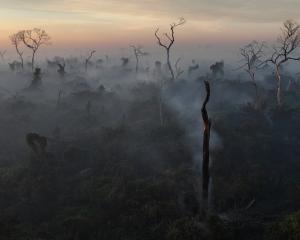Dunedin will have to "roll with the punch" when hit by climate change - riding out higher seas, more severe flooding and a host of other challenges, a leading New Zealand climatologist says.
The assessment from University of Otago climatologist Emeritus Prof Blair Fitzharris came last week as world leaders in Copenhagen convened to thrash out a global agreement to protect the environment.
Prof Fitzharris, a climatologist for 42 years, was the convening lead author for the Australia and New Zealand chapter of the latest global report from the Intergovernmental Panel on Climate Change (IPCC).
He has also just been commissioned by the Dunedin City Council to prepare a report on the likely impact of climate change in Dunedin.
Speaking from his Queenstown home, Prof Fitzharris said civic leaders and their communities needed to think about adaptation - learning to live with climate change.
"Climate change is going to happen. There's very little the city can do about it. It needs to roll with the punch, so to speak.
"In order to do that, you are going to have to think about where you are most vulnerable and what some of the options might be."
The impact of climate change would be felt in different ways across Otago, but the worst problems would be seen in Dunedin through rising sea levels and rivers more prone to flooding.
The city needed to prepare for repeats of the 1929 flood, which occurred after a severe downpour dumped 200mm of rain on Dunedin in a single day, Prof Fitzharris said.
Sea-level rise was likely to be an "ongoing battle", with the latest reports - following greater-than-expected melting of ice in western parts of the Antarctic and Greenland - suggesting sea levels could rise by up to 1.5m by 2100, he said.
That would be worse than the 0.6m increase predicted in the last IPCC report in 2007 and would pose the biggest problems around parts of Otago Harbour, coastal areas such as St Kilda and St Clair and possibly parts of South Dunedin, he said.
Prof Fitzharris' report outlining what to expect would be presented to the council in March, enabling decisions to protect infrastructure that could be vulnerable as soon as 2040, he said.
Council city environment general manager Tony Avery said work to protect infrastructure had begun, including in the design of the Tahuna wastewater project and the upgrading of Portobello Rd.
The council had also adopted the IPCC's third and fourth estimates on climate change, including sea-level rise, when planning new infrastructure projects, among other initiatives, he said.
Otago Regional Council chief executive Graeme Martin said staff had, in recent years, also worked to identify the major challenges arising from climate change across Otago.
A meeting of council staff from around Otago would be staged in March next year to discuss the issues, followed by public presentations around the middle of the year, he said.
"We have got years to adapt to it, but of course you don't get adaptation if you don't plan for it," he said.











